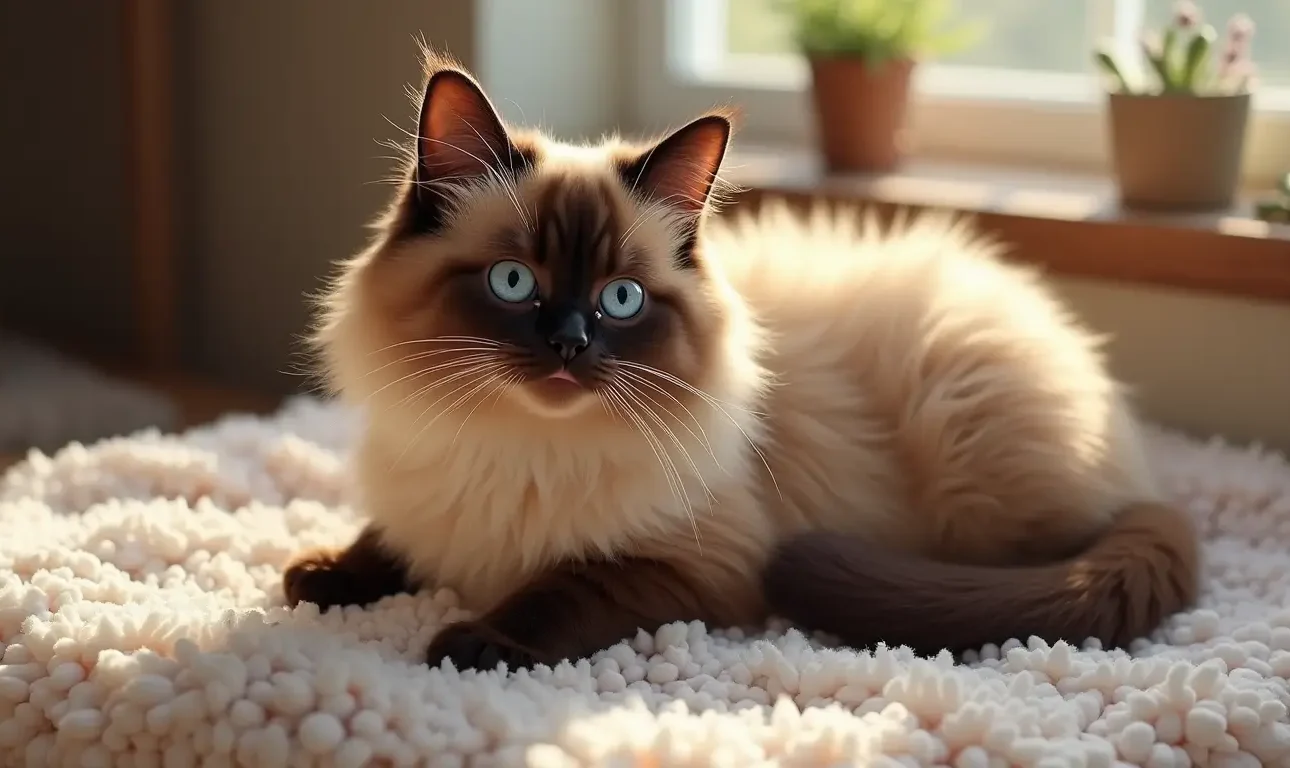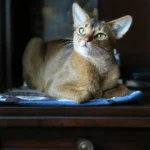If you love cats, you’ve probably heard about the Brown Ragdoll breed. They are known for their beautiful looks and loving nature. These big cats are perfect pets for many families. In this guide, we’ll cover everything you need to know to care for your Brown Ragdoll.
Whether you already have a cat or are thinking of getting one, this article is for you. We’ll share tips on how to keep your Brown Ragdoll happy and healthy. From their special traits to grooming and feeding, we’ve got all the answers. Let’s start this adventure and learn how to care for your Brown Ragdoll cat.
Table of Contents
Understanding the Brown Ragdoll Cat Breed Origins and Characteristics
The brown Ragdoll cat is a unique feline breed known for its looks and personality. It was developed in the 1960s by Ann Baker in Riverside, California. This breed’s physical traits and friendly nature have made it a favorite among cat lovers globally.
Physical Features and Color Variations
Ragdoll cats are medium to large, with a strong yet balanced body. Their semi-long, silky fur comes in many colors and patterns. Brown Ragdolls can have shades from chocolate to cinnamon, with white markings on their face, paws, and belly.
They also have striking blue eyes and pointed coat patterns. These features make them stand out.
Breed History and Development
The Ragdoll breed was introduced in the 1960s by Ann Baker in California. Baker was drawn to a cat named Josephine’s friendly and floppy nature. She aimed to create a breed that was both endearing and physically distinct.
The name “Ragdoll” comes from their tendency to go limp when picked up, like a ragdoll.
Distinctive Personality Traits
The Ragdoll breed is loved for its calm, affectionate, and intelligent nature. Ragdolls are often described as “dog-like” in their loyalty and desire for human interaction. They are gentle with children and other pets, making them great for families.
Ragdolls also adapt well to both indoor and outdoor environments with the right care.
Essential Care Requirements for Your Ragdoll
Caring for your Ragdoll cat is a big job. It’s important to know how to groom, feed, and exercise them. This will help them stay happy and healthy.
Grooming and Maintenance Tips
Ragdolls have beautiful, long fur that needs regular grooming. Brush them twice a week to keep their fur looking good. Use a slicker brush or a metal comb to gently remove tangles and loose hair.
Also, trim their nails every few weeks. Clean their ears now and then to keep them clean.
Diet and Nutrition Guidelines
Ragdolls need special food because of their size and calm nature. Feed them high-quality, protein-rich cat food. Make sure it’s right for their age and how active they are.
Don’t overfeed them because they can easily get too heavy. This can cause health problems. Always have fresh water available. You can also give them treats or wet food sometimes to keep them happy.
Exercise and Environmental Needs
- Ragdolls need some exercise but not as much as other cats.
- Give them toys, scratching posts, and climbing structures to play with.
- Make sure they have a safe place to move around and explore.
- Use cat trees, window perches, and puzzle feeders to keep them entertained.
| Grooming Requirement | Feeding Recommendations | Exercise Needs |
|---|---|---|
| Brush 2-3 times per week | High-quality, protein-rich cat food | Moderate activity level |
| Trim nails every 4-6 weeks | Portion control to prevent weight gain | Interactive toys, scratching posts, and climbing structures |
| Clean ears periodically | Supplement with occasional treats or wet food | Enriched environment with ample space |
By following these care tips, your Ragdoll will be happy and healthy. They will be a great addition to your family.
Health Considerations and Common Medical Issues
Welcoming a Brown Ragdoll cat into your home comes with health considerations. Ragdolls are usually healthy but can face certain health issues. These need careful attention and regular check-ups.
Hypertrophic cardiomyopathy (HCM) is a big concern for Ragdolls. It’s a heart disease that can cause serious problems if not treated. Regular vet visits and heart screenings are key to managing HCM.
- Ragdolls might also get polycystic kidney disease (PKD), affecting their kidneys. It’s important to check their kidney health regularly to catch and treat it early.
- Feline lower urinary tract disease (FLUTD) is another common issue. It can make your Ragdoll uncomfortable and lead to serious problems if not treated quickly.
It’s wise to find a vet who knows about Ragdolls. Regular check-ups, preventive care, and quick action when your cat is sick can help them live a long, happy life.
“Investing in your Ragdoll’s health is the best way to enjoy their companionship for years to come.”
Creating the Perfect Living Space for Your Brown Ragdoll Cat
The brown Ragdoll cat loves to be around people and needs a special place to live. Think about what your Ragdoll needs to be happy and comfortable. This will make sure your cat feels right at home.
Accommodating Their Size and Playfulness
Ragdolls are big and love to play. They need lots of room to climb and play. Get sturdy cat trees and platforms for them to explore.
Interactive toys like wand toys and puzzle feeders are great. They keep your Ragdoll’s mind and body active.
Fostering Bonding and Socialization
Ragdolls love people and enjoy being close to their owners. Make cozy spots for you and your cat to relax together. A window seat or a comfy cat bed near your chair is perfect.
Make sure your Ragdoll can move around easily. This helps them feel connected to you and their home.
Maintaining a Safe and Comfortable Environment
Ragdolls are gentle but can get hurt easily. Keep your home safe by securing cords and fragile items. Use soft, cushioned surfaces to protect them.
Keep your home at a comfortable temperature. Also, provide hiding spots and perches for your Ragdoll to feel safe.
| Feature | Importance for Ragdolls |
|---|---|
| Vertical Space | Allows for climbing, scratching, and lounging at different levels |
| Interactive Toys | Encourages physical and mental stimulation |
| Cozy Bonding Spots | Promotes strong owner-cat relationships |
| Safety Measures | Protects Ragdolls from potential injuries due to their relaxed temperament |
Designing a special space for your Ragdoll makes them happy and strengthens your bond. It’s all about creating a place that meets their needs and makes them feel loved.
Conclusion
The brown Ragdoll cat is a true gem among feline breeds. They have striking physical features and are very affectionate pets. Many pet owners have fallen in love with them.
We’ve looked into the Ragdoll breed’s origins and traits. We also talked about the care they need to thrive. Knowing their grooming, diet, and living needs helps ensure they’re happy and healthy.
Having a Ragdoll cat is rewarding. They are loyal and loving. With the right care, they become a cherished family member. They bring joy, laughter, and love into your life. If you’re thinking of getting a Ragdoll, it’s a wonderful choice. They will bring happiness and companionship into your home.
FAQ
What are the unique characteristics of the brown Ragdoll cat?
Brown Ragdoll cats are big and muscular. They have a soft, long coat in rich brown colors. They are very affectionate and love to be held, earning them the name “Ragdoll.”
How did the Ragdoll breed originate?
The Ragdoll breed was created in the 1960s by Ann Baker in California. She started with a calm domestic cat. She bred it to make the Ragdoll we know today.
What are the grooming requirements for a brown Ragdoll cat?
Brown Ragdolls need regular grooming. Brush them a few times a week to keep their coat looking good. They also need occasional baths and nail trims.
What are the dietary and nutritional needs of a Ragdoll cat?
Ragdolls need a special diet because of their size and energy. They should eat high-quality, protein-rich food for adult cats. Make sure they always have fresh water.
How much exercise do Ragdoll cats need?
Ragdolls need regular exercise and mental play. Give them toys, cat trees, and playtime to keep them happy and healthy.
What are some common health issues to be aware of with Ragdoll cats?
Ragdolls might get certain health problems like heart disease, bladder stones, and hip issues. Regular vet visits can help catch these early.
How can I create an ideal living environment for my brown Ragdoll cat?
For your brown Ragdoll, think about their size, love for people, and need for fun. Get sturdy furniture, lots of places to climb, and toys. Make sure they have cozy spots and time with you.






